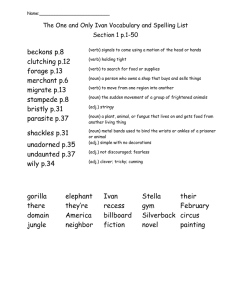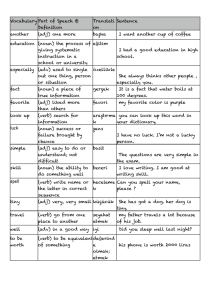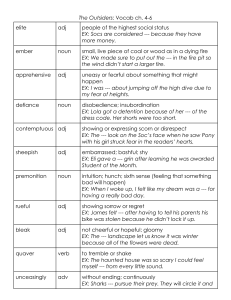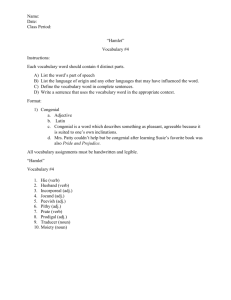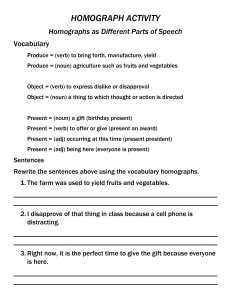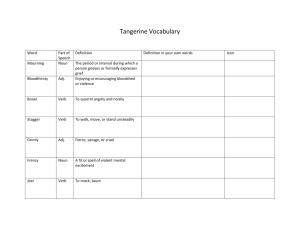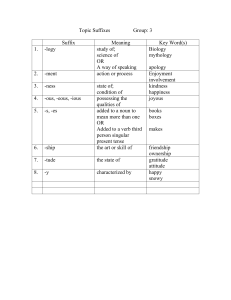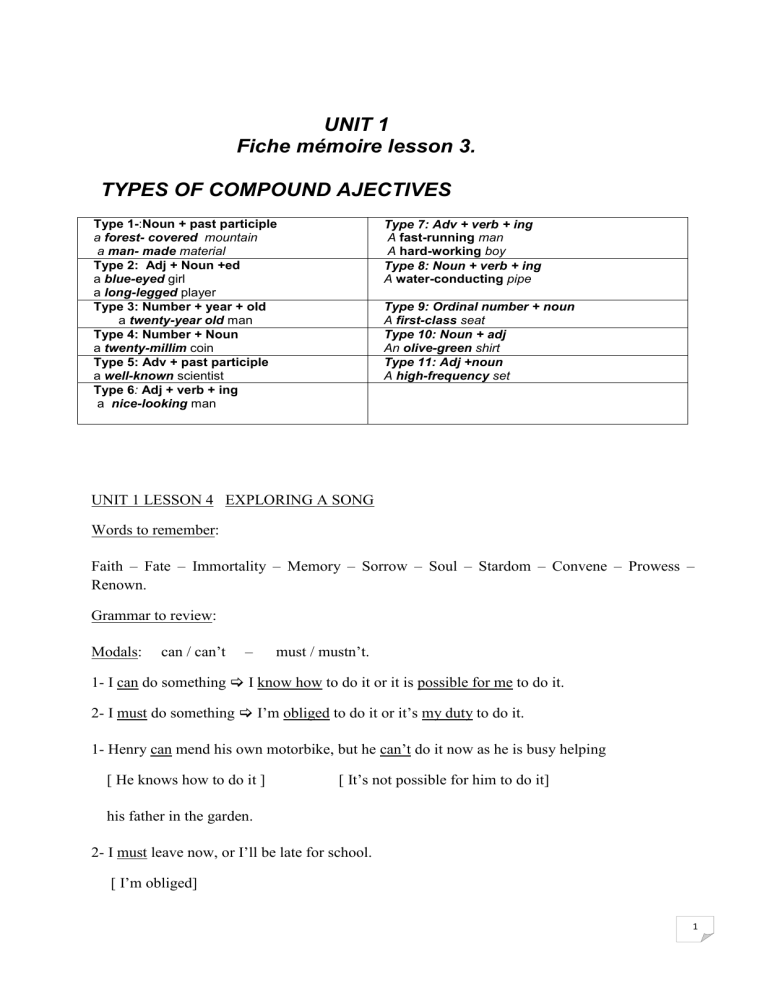
UNIT 1 Fiche mémoire lesson 3. TYPES OF COMPOUND AJECTIVES Type 1-:Noun + past participle a forest- covered mountain a man- made material Type 2: Adj + Noun +ed a blue-eyed girl a long-legged player Type 3: Number + year + old a twenty-year old man Type 4: Number + Noun a twenty-millim coin Type 5: Adv + past participle a well-known scientist Type 6: Adj + verb + ing a nice-looking man Type 7: Adv + verb + ing A fast-running man A hard-working boy Type 8: Noun + verb + ing A water-conducting pipe Type 9: Ordinal number + noun A first-class seat Type 10: Noun + adj An olive-green shirt Type 11: Adj +noun A high-frequency set UNIT 1 LESSON 4 EXPLORING A SONG Words to remember: Faith – Fate – Immortality – Memory – Sorrow – Soul – Stardom – Convene – Prowess – Renown. Grammar to review: Modals: can / can’t – must / mustn’t. 1- I can do something I know how to do it or it is possible for me to do it. 2- I must do something I’m obliged to do it or it’s my duty to do it. 1- Henry can mend his own motorbike, but he can’t do it now as he is busy helping [ He knows how to do it ] [ It’s not possible for him to do it] his father in the garden. 2- I must leave now, or I’ll be late for school. [ I’m obliged] 1 We all must help the needy. [ It’s our duty ] Functions to use: Expressing like / dislike: I (don’t) like / love I’m (not) fond of + (noun) or (Verb + ing). I’m (not) keen on I’m (not) mad / crazy about I like / love pop songs. / I’m fond of little cats. I like / love walking in the rain. / Lucia is very keen on pets. I’m not very fond of dancing. / My brother is mad about video games. We are keen on travelling. / They are crazy about skiing. UNIT 1. LESSON 5. WALKING TOUR. Words to remember: Venue / Constituent / Cosmopolitan / Border / Spectacular / Residence / The year round. 1- Venue (n) = Place where a public event or meeting happens. 2- Constituent (n) = One of the parts that a substance or mixture is made of. 3- Cosmopolitan (adj.) = Consisting of people and things from many different countries. 4- Border (n) = The line that separates two countries or states. 2 5- Spectacular (adj.) = Very good, exciting or surprising. 6- Residence (n) = The place where someone lives. 7- The year round = Throughout the year. Grammar to review: The Comparative & Superlative of short / long adjectives. COMPARATIVE SUPERLATIVE TYPE FORM EXAMPLE TYPE FORM EXAMPLE one syllable adj. + er younger one syllable adj. + est the youngest two syllables adj. + er happier two syllables adj. + est the happiest ending in ‘y’ two syllables ‘y’ becomes ‘i’ adj. + er ending in ‘y’ narrower ending in ‘ow’ two or more adj. + est the narrowest ending in ‘ow’ more + adj. more expensive syllables two or more the most + adj. syllables Adj. ending in ous, ive, ent, two syllables ‘y’ becomes ‘i’ expensive more courageous Adj. ending in more + adj. more interesting ous, ive, ent, the most the most the most + adj. interesting. ful, al, ed, ing, more practical ful, al, ed, ing, the most ic, ical, able. more talented ic, ical, able. beautiful REMINDER LESSON 7 The Reported Speech. Any human speech is divided into 3 categories: (1) statements; (2) questions and (3) commands. (1) Statements are either affirmative or negative. TENSE CHANGES WHEN THE REPORTING VERB IS IN THE PAST 3 DIRECT SPEECH INDIRECT SPEECH - Simple present (use ) Simple past ( used) -present continuous (is using ) Past continuous ( was using ) -Simple past ( used) Past perfect (had used) -Past continuous ( was using) Past perfect continuous( had been using) - present perfect( has used) Past perfect ( had used) -present perfect continuous ( has been Past perfect continuous ( had been using ) using) -Future (will use) Present conditional (would use) must Had to can could may might Would , should , ought to , had better, might, used to , do not normally change . (2) Reporting questions. We start an indirect question with a verb like “ask”, “inquire “, “wonder”, "want to know” If the indirect question starts with a question word “who” , “where” , “what” … the question word is repeated .Eg : “What do you want? “ He asked them what they wanted If there’s no question word, "if” or “whether “ must be used Eg: “ is anyone here ? “ . He wanted to know if anyone was there. (3) Reporting commands. The introductory verb say changes to a verb of command, request or advice such as tell , order ,command, ask , advise etc… The function of any command is either to ‘encourage’ someone “to do” something or “not to do” something. 4 The verb used is put in the infinitive. Example : The writer: “ Go travel somewhere and see some Shakespeare” The writer advised us to go travel somewhere and to see some Shakespeare. The doctor to a patient: “Don’t eat fatty food.” The doctor advised the patient not to eat fatty food. The winter’s Tale. Part 2. Arts section MEMORY AID SHEET 2 Adverbs . Adjective + ly We use an adverb to describe a verb(action) : He speaks slowly An adverb can be used to describe an adjective: it’s extremely difficult 3- Adj+ noun +ed = Compound adjective Example : a kind- hearted person Unit II Lesson 7 Linkers of sequence. First(ly) Second(ly) Last In the first place Next - Then - More important finally To begin with On top of that Lesson 9 5 Many adjectives in English can be preceded by “the” to refer to a category of people. “The rich” refers to a social class who have certain material prerogatives. “The blind” refers to the group people who cannot see in general. The+adj= plural noun: The blind, the rich are plural nouns. You can do the same with the following list of adjectives: elderly – homeless – young – disabled – sick – needy – poor – deaf – unemployed – handicapped Unit III. Lesson 1 Be / get (1)used to+noun/ ing form is different from(2) used to +infinitive. Here ‘used’(1) is an adjective, and it means “familiar with.” However, ‘used to’(2) expresses a past habit. Compare the following examples. (1) People in the south of Tunisia are used to working in hot weather. (2) I used to go for long walks in the countryside when I was young. Lesson 2 Present Perfect FORM: Positive has/have + past participle Negative Question 6 I I You you we have we they I Have not/ haven’t Have they he worked worked he has it we they worked she you she it he Has not/ Has she it Hasn’t Uses : • The present perfect describes the indefinite past: “I've been to Paris.” “I’ve seen this film before.” • The present perfect is often used to describe personal experience: “I've been to Berlin.” • The present perfect is not used with past time words (last night, yesterday, in1984, etc). It is not possible to say “I've seen him yesterday.” • The question form is often Have you ever ...? (= in your life?) “Have you ever been to Paris?” Present Perfect with for and since just, yet, already, ever and never. • The present perfect + for/since is used when something started in the past and is continuing now. • for + period of time: I've lived here for six years. • since + a point in time in the past: I've lived here since 1987. Lesson 3 7 A- If a verb ends in a /t/or /d/ sound the final “ed” is pronounced /id/. B- If a verb ends with one of these sounds (not letters)/p/,/s/,/ k/, /f/,/∫/, /t∫/ or /θ/, the final “ed” is pronounced /t/. C- If a verb ends with one of these sounds (not letters) /b/, /g/,/ l /, / z /, / v/. /ʒ /.ʤ /, /w/./ h /. / j /.ð/, /m/, / n /./ r / or/ ŋ / or a vowel sound the final “ed” is pronounced /d/ Unit IV Lesson 4 The inversion of the subject and verb in English happens in questions, imperatives and conditional sentences. However, we can also use inversion for emphasis. 8
